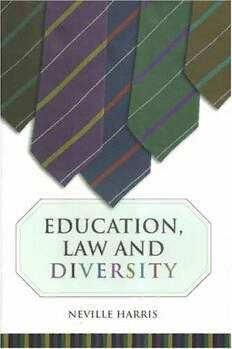
Education, Law And Diversity PDF
535 Pages·2007·5.147 MB·English
Most books are stored in the elastic cloud where traffic is expensive. For this reason, we have a limit on daily download.
Preview Education, Law And Diversity
Description:
Education is fundamentally concerned with realizing the potential of every child, but increasing social diversity presents enormous challenges for the state in terms of its commitment to providing an appropriate education for all. Factors such as ethnicity, disability, and material deprivation are associated with inequality, social exclusion, and the risk of low educational attainment. Diversity also reflects divergent cultural values and norms. In responding to the challenges posed by diversity, public education authorities are to some extent constrained by individual or group rights. This book examines the nature of these rights, including those under the European Convention on Human Rights, and the ways and contexts in which they operate. Their social effects are also considered. Areas discussed include the curriculum, special educational needs, and the choice of school. A key theme in the book is the promotion and enforcement of equal access to education, including higher education. Issues of multiculturalism, the social integration of minorities, religion in education, and the recognition of children's independent rights are also discussed. The book centers on England and Wales and covers the evolving legislative framework, including the Education and Inspections Bill 2006, but relevant legal developments in other states are also highlighted.
See more
The list of books you might like
Most books are stored in the elastic cloud where traffic is expensive. For this reason, we have a limit on daily download.
